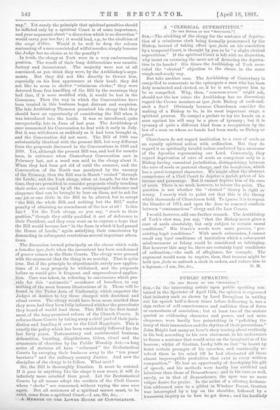A " CLERICAL SUPERSTITION."
[TO THE EDITOR Or THE " SPEOTATOR."J SIR,—The stickling of the clergy for the sentence of depriva- tion of a criminous clerk being formally pronounced by the Bishop, instead of taking effect ipso facto on his conviction by a temporal Court, is thought by you to be " a slight clerical superstition." If the spiritual Court is left with no discretion, why insist on retaining the mere act of decreeing the depriva- tion in its hands ? His Grace the Archbishop of York over- ruled the " clerical " objection to the clause in the same- rough.and-ready way.
But take another case. The Archbishop of Canterbury is. compelled to consecrate to the episcopate a man who has been duly nominated and elected, or, if he is not, suppose him to- be so compelled. Why, then, " common-sense " might ask,. should not the law (since the Archbishop has no discretion). regard the Crown nominee as ipso facto Bishop of such-and- such a See P Obviously because Churchmen consider the making of a Bishop to be, in its most important stage, a. spiritual process. To compel a prelate to lay his hands on a man against his will may be a piece of tyranny ; but it is. tyranny of quite a different kind from a recognition by the law of a man on whom no hands had been made, as Bishop or priest.
Churchmen do not regard institution to a cure of souls as an equally spiritual action with ordination. But they do regard it as spiritually invalid unless conferred hy a successor• of the Apostles representing our Lord. Conversely, they regard deprivation of cure of souls as competent only to a Bishop having canonical jurisdiction, distinguishing between the cure of souls or pastoral charge, and the beaefIcium„ which. has a quasi-temporal character. We might allow the abstract competence of a Civil Court to deprive a parish priest of his. income and parsonage. But it cannot deprive him of his cure of souls, There is no need, however, to labour the point. The question is not whether the " clerical " theory is right or wrong. I merely wish to point out that this is the theory which thousands of Churchmen hold. To ignore it is to repeat the blunder of 1874, and open the door to renewed, conflicts between "contumacious " clergy and the Law Courts.
I would, however, add one further remark. The Archbishop of York's view was, you say, " that the Bishop never gives a. cure of souls absolutely, but only subject to certain moral conditions." His Grace's words were more precise, " pre-- existing legal conditions." With much submission, I cannot recall any legal conditions of institution which a subsequent. misdemeanour or felony could be considered as infringing.. But however this may be, there are certainly legal conditions. of ordination,—the oath of allegiance, for example. The argument would seem to require, then, that treason might be- held ipso facto to unfrock a clerk in orders, and reduce him to


































 Previous page
Previous page